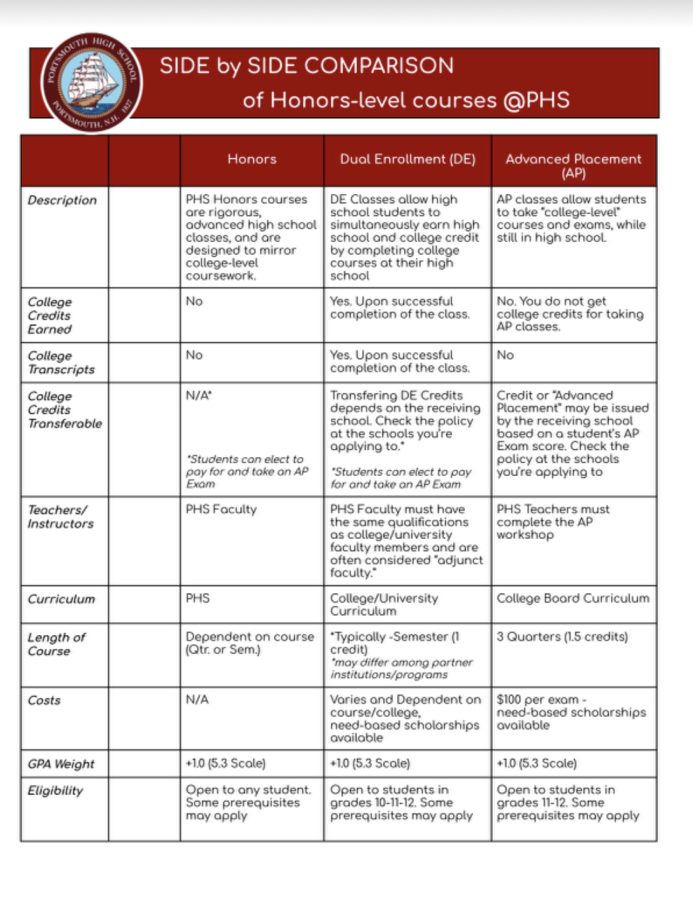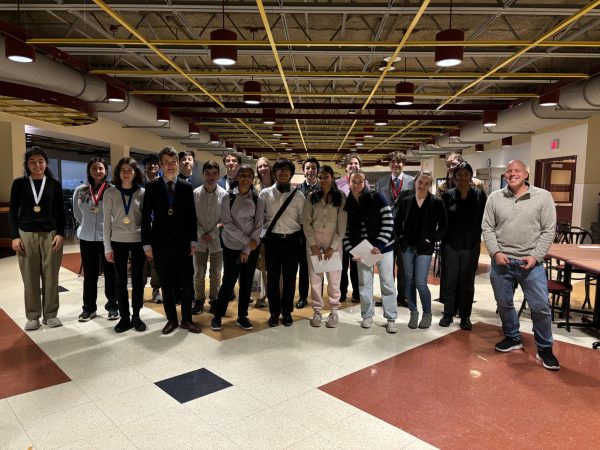PHS Sees a Shift to Dual Enrollment for the 2023-24 School Year
Advanced Placement (AP) courses have long been provided by Portsmouth High School and utilized by its students. They’re meant to provide them with college-level coursework in various subjects. However, the recent switch to Dual Enrollment for the 2023-24 school year pauses these classes, leaving AP Physics I and II.
DE allows students to take college courses and earn college credits while still in school. They are offered through a partnership between high schools and colleges– in our case, between PHS and GBCC, UNH, SNHU, LCC, and MCC.
According to the PHS program of studies:
“One goal of PHS is to continually explore adding opportunities for our students. Two important definitions of innovation that help us shape our organizational goals are that innovation is ‘the relentless pursuit of opportunity’ (Michael Porter, HBS) and ‘doing things differently enough to get better results’ (Dennis Littkey, Big Picture Learning). We hope that by opening up the discussion we will be able to accomplish both goals and become even more effective as a learning organization.”
Cynthia Young, PHS social studies teacher and department head, taught AP European History for over five years when she switched this year to DE. When asked about the change, she immediately asserted that DE is much better.
“This course does not assume that students come in college ready, but it ensures that they leave ready,” commented Young.=
The reason behind Ms. Young’s advocacy lies in the fact that so many more students challenged themselves this year, compared to past years. “The focus should be giving students opportunities, and this is exactly what DE is doing,” she said.
In a report by the College Board, comparisons between the two shows that students who took AP courses and received a score of 3 or above on at least one AP exam showed better performance in all measured outcomes except enrollment in a four-year college. However, students who had taken a dual enrollment course associated with a four-year college had the highest enrollment rate.
Christopher Schoff, PHS’s AP Statistics teacher, also provided his input: “I believe change is good, as long as it is what is best for the students.”
He believes it depends on how the student looks at it. If a student views broader coverage as ideal and is well-off with standardized testing, AP is better. If they prioritize experience within college work and in-depth focus, DE is better. Though it is safe to say Mr. Schoff will miss the three-quarter class and its memories.
Memories cultivated over three-quarters aren’t only unique to Mr. Schoff’s room, however. Elizabeth Hoyt, the new AP Biology teacher, similarly views the shift as a disadvantage for students who wish to cover more material.
Specifically, in AP Biology, three units (Gene Expression and Regulation/ Natural Selection/ Cellular Energetics) out of eight offered will no longer be a part of the curriculum. This places a disadvantage for students who still aim to take the AP test, as these units can make up to 50% of the test according to the college board.
When speaking of the pros, Hoyt did assert that it greatly helps students save money on tuition costs and potentially graduate from college early, as DE credits often provide more transferable college credits than AP courses.
Naturally, students’ preferences came down to two things: efficiency and interest. Ava Schlosser, a junior at PHS who has taken AP Stats, agrees with Mr. Schoff. “It does depend on the student, but maybe this is a step towards eliminating standardized testing in the future– which is good news for all students,” she said.







